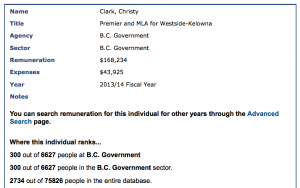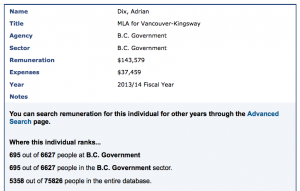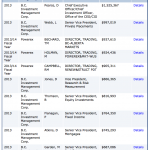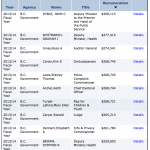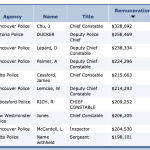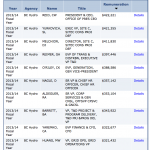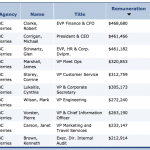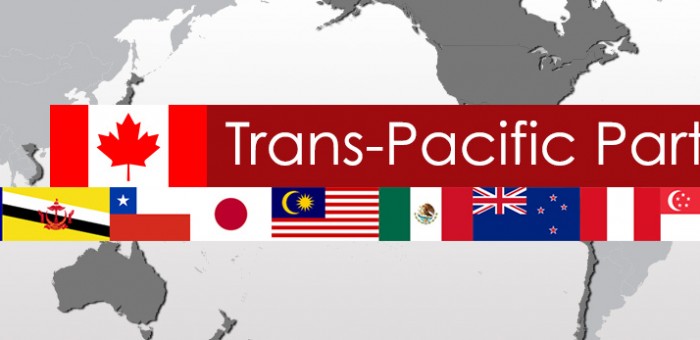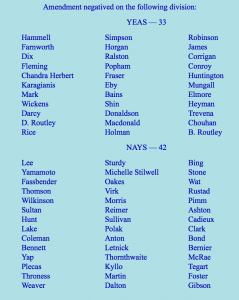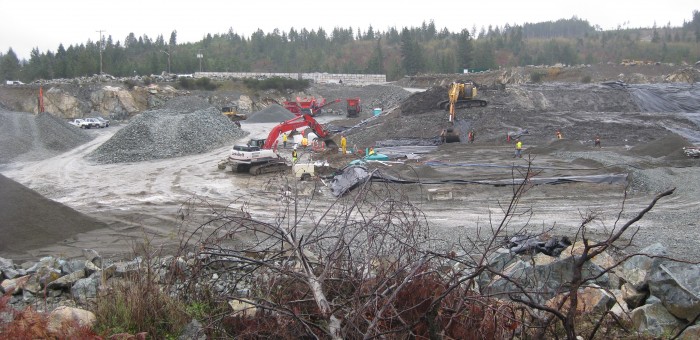Media
On corporate and union donations, and party leader stipends
Introduction
The subject as to whether or not corporate and union donations to political parties should be allowed in British Columbia has been a matter of debate for quite some time. It resurfaced in the headlines over the last few days.
On April 25th the Dogwood Initiative released polling results showing that “86% of British Columbians would support a ban on corporate and union donations before the next election“.
Two days later Gary Mason wrote a story in the Globe and Mail stating:
“The Globe and Mail has learned that Ms. Clark is given between $30,000 and $50,000 a year from the BC Liberal Party for work she does for it throughout the year, including attending fundraising events. “
in the same piece, the Leader of the Official Opposition is quote as saying he’s received reimbursement for a “couple of suits” totaling about $5000 since becoming Leader in 2014.
In a second piece, published later that day after the BC NDP raised the issue in Question period, Gary Mason piled on the evidence as to why he believes party stipends to premiers shouldn’t be allowed. He noted that BC is one of only two provinces in Canada where a provincial premier gets a stipend from the political party (Saskatchewan being the other). And he suggested that since one of the duties of a provincial party leader is to fundraise, a perception could be left that there is a potential conflict.
The Vancouver Sun also picked up the story as did the Tyee a day later. Both these articles included quotes from a letter that MLA David Eby submitted to the conflict or interest commissioner.
Union and Corporate Donations in BC Politics
The BC Green Party, the BC NDP and Independent Member Vicki Huntington (Delta South) have long called for a ban on union and corporations in BC politics. As I’ve noted in numerous speeches in the legislature, unions don’t vote; corporations don’t vote; only people vote. BC is the wild west in terms of its lax rules for political donations. Any person, union or corporation anywhere in the world can donate any amount of money they want to any party any time they want! It leaves one wondering whose interests are being represented.
Let’s take a quick look at some data from the recent financial reporting to Elections BC.
 The BC NDP 2015 Financial Report notes that the BC Government & Service Employees Union donated $92,679.42 to the BC NDP. The United Steelworks Union donated $66,325 to the BC NDP during this period.
The BC NDP 2015 Financial Report notes that the BC Government & Service Employees Union donated $92,679.42 to the BC NDP. The United Steelworks Union donated $66,325 to the BC NDP during this period.
The BC Liberal 2015 Financial Report notes that The Independent Contractors and Businesses Association of BC donated $47,000 to the BC Liberals. KGHM Ajax Mining Inc. donated $29,000, and the New Car Dealers Association of BC also donated $62,225 to the BC Liberals.
The issue of union and corporate donations raises other potentially troubling concerns. A corporation is governed by a board that ultimately serves at the will of the corporation’s shareholders. As such, donations made by corporations are being done so whether or not a shareholder approves of such donations. In essence, shareholders are having their money used to support a political party even if they don’t support that political party. The same is true for union donations. Union members have dues taken from their paycheques to fund the operations of their unions. There may be members of a union who support a party other than the party that the union that represents them is donating to. In both cases, a chosen few individuals are making the decision as to which political party their shareholders/members will support financially.
The Case of Mount Polley
From January 1, 2012 until May 13, 2013 (the date of the last provincial election), the United Steelworkers Union and several of its Locals donated a total of $636,484.34 to the BC NDP. During the same time, Imperial Metals Ltd donated a total of $24,110 to the BC Liberals. Mount Polley Mining Corporation also donated $45,720 to the BC Liberals.
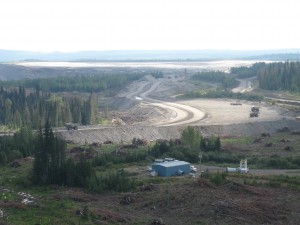 After the tailings pond breach at the Mount Polley mine site, there were a number of newspaper stories pointing out that Imperial Metals, its controlling shareholder, and Mount Polley were all major donors to the BC Liberal Party (see for example a Vancouver Observer article). Imperial Metals was a very minor donor to the BC NDP as well. But as I indicated above, the BC NDP also received substantial donations from the United Steelworkers Union, the union that represents workers at the Mount Polley mine. In fact, Stephen Hunt, USW District 3 (Western Canada) Director, specifically called for USW members to support the BC NDP in the May 2013 election.
After the tailings pond breach at the Mount Polley mine site, there were a number of newspaper stories pointing out that Imperial Metals, its controlling shareholder, and Mount Polley were all major donors to the BC Liberal Party (see for example a Vancouver Observer article). Imperial Metals was a very minor donor to the BC NDP as well. But as I indicated above, the BC NDP also received substantial donations from the United Steelworkers Union, the union that represents workers at the Mount Polley mine. In fact, Stephen Hunt, USW District 3 (Western Canada) Director, specifically called for USW members to support the BC NDP in the May 2013 election.
The purpose of me highlighting the Mount Polley situation is to detail a very real example of why we need to take big union and big corporate money out of BC politics as we have done federally. Government is elected by the people to serve the people of British Columbia. In the case of the Mount Polley incident, the government and the official opposition had to make some very difficult decisions. What, if any, penalties should be implemented? When should the mine be reopened? How should it be monitored? While I am confident that both the government and the official opposition put the best interests of people first and foremost in this case, there will always be those who will question any resulting decision because of the perception that arises when union and corporate money is donated to political parties.
Public Sector Salaries in BC
The Vancouver Sun regularly publishes public sector salaries so its relatively straightforward to track what public sector employers are earning. Below I reproduce the most recently available entries from the 2013/2014 fiscal year for both the Premier (Christy Clark) as well as the Leader of the Official Opposition at the time (Adrian Dix). As you can see from the link images below, Christy Clark’s salary ranked 300th out of 6,627 people within the B.C. Government category; overall she was the 2734th out of 75,826 listed in the database. Adrian Dix’s salary ranked 695th out of 6,627 people with in the B.C. Government category; overall he was 5,358th out of 75,826 listed in the database.
2013/2014 salary for Premier (left) and leader of the opposition (right).
John Horgan took over as leader of the BC NDP in 2014. Publicly available data has yet to make it onto the Vancouver Sun site since Mr. Horgan took office. Nevertheless, the BC Legislature is transparent with respect to MLA salaries.
As of April 1, 2015, an MLA in British Columbia earns $102,878.00. This is the salary I earned as an MLA during the 2015/16 fiscal year. The Premier gets a 90% additional salary increase from this base amount and so was paid $195,468.20 during that time. Her Ministers, the Speaker as well as the leader of the official opposition (John Horgan) receive a 50% additional salary. As such, these elected officials all received $154,317 during the 2015/16 fiscal year.
Despite the fact that I am the leader of the BC Green Party, I do not receive an additional salary from the BC legislature. This is because in order for the BC Green Party to have official party status, we would need four elected members in the legislature. This didn’t stop the New Brunswick and Prince Edward Island legislatures from granting official party status to the New Brunswick and Prince Edward Island Green parties despite that fact that they too had only one MLA elected. Had the BC government seen it fit to grant the BC Greens official party status, I would have a 25% additional salary (for an overall $128,597.50).
A natural question then is who are these other 300 people in the BC government and 2,733 people in BC’s public sector who earn more than the premier? Once more, it’s relatively easy to find that our from the Vancouver Sun’s database. Below I reproduce screenshots of the top 10 salaries in nine specific categories.
Entire Public Sector BC Government Local Government
School Districts Health Authorities Municipal Police
BC Hydro BC Ferries UBC
What should become abundantly apparent is that public sector salaries appear to be out of control in certain sectors. That there are 2,733 people in BC’s public service that earn more than the premier of our province is mind boggling to me. In my view, British Columbia needs to take a very serious and hard look at executive compensation in our public service sector.
The Ethics Receiving a Stipend to Serve as Party Leader
As noted earlier, the topic of union and corporate political donations resurfaced in the headlines last week in concert with public discussion about the appropriateness of political parties giving their leader a stipend for serving in that capacity. The premier has argued that she does two jobs: one as the premier; one as leader of the political party. I have some sympathy for this argument.
While I know that the official opposition made hay over the fact that the premier received a $50,000 stipend for being leader of the BC Liberals, I would argue that it’s somewhat rich for them to try and claim the moral high ground. Leader, John Horgan, admitted to receiving about $5000 in suits from the BC NDP. I have checked the last three years (2013, 2014 and 2015) of public disclosures and do not see any disclosure of this as a remuneration or gift. The same disclosures for the premier identify she received a “Leader’s allowance” in each of these years. Perhaps there is some exemption that I am unaware of or the suits were given in 2016. Either way, I get the sense that it’s a bit like the so-called pot calling the kettle black.
This idiom also applies to the fact that the BC NDP has been calling out the BC Liberals for selling exclusive access to the premier via $10,000 a plate private dinners. Ironically, as Vaughn Palmer points out, when the NDP made such statements Horgan was off to Toronto for an exclusive $5,000 per seat fundraising breakfast. In each case, the names of the attendees were confidential and it’s not as if either the premier or leader of the official opposition have any plans of ceasing these exclusive fundraising activities.
David Eby, MLA for Vancouver Point Grey, submitted a letter to the Conflict of Interest Commissioner on April 27. While I don’t want to prejudge the outcome of Mr. Eby’s complaint, I feel it is important for me to comment on its content. First, the fact that the letter was made public and given out during a press event on the steps of the Office of the Conflict of Interest Commissioner undermines the process itself. I find this guilty until proven innocent public approach to seeking a ruling very troubling. In addition, I am somewhat surprised by the wording of allegations contained in Mr. Eby’s letter. To be frank, I think Mr. Eby has gone too far and I believe his choice of language is most unfortunate and unbecoming of someone of his stature.
Summary
Since becoming the Leader of the BC Green Party in December 2015, I have neither received a stipend nor have I received any suits. I also do not receive the additional salary as leader of a 3rd party in the BC Legislature. Present rules allow for parties to pay their leaders stipends. I have no problem with this. But what I have a substantial problem with is fourfold.
- I firmly believe that we should pass legislation to ban union and corporate donations in British Columbia sooner rather than later.
- There should be no doubt, that the amount of money that the BC Liberals receive from corporations begs the question as to whose interests are being looked after.
- I find it a bit rich for the BC NDP to try and claim the moral high ground as they follow similar practices to what they are criticizing the BC Liberals for. While the magnitudes involved may be different, morally a gift or stipend or union/corporate donation is still the same.
- I frankly think that the premier and the leader of the official opposition are underpaid relative to other senior executives in the public sector.
I look forward to your comments on this piece.
Opposing the Trans Pacific Partnership Agreement
Today in the Legislature I rose to speak strongly against the cynical motion brought forward by the BC Liberals:
Be it resolved that this House, acknowledging the importance of diversifying trade to create jobs for British Columbians, supports the Trans-Pacific Partnership because: the Trans-Pacific Partnership removes trade barriers and provides preferential market access for B.C. goods and services from all sectors including forest products, agrifoods, technology, fish and seafood, minerals and industrial goods, and through the transition support will be available to our supply-managed industries; the Trans-Pacific Partnership provides more access for service providers in professional, environmental, and research and development fields; and, ultimately, the Trans-Pacific Partnership will increase investment and create new jobs and opportunities for many British Columbians.
Let’s be very clear, this motion was introduced purely for political reasons — political reasons aimed at painting the BC NDP as the “Party of No”. As I pointed out in the fall, the motion to support the Trans Pacific Partnership was put on the order papers before the text of the TPP was even available. The BC Liberals made up their mind before even reading the text. In my mind, that is a reckless approach to governing.
The TPP, especially the investor-state dispute settlement clauses, poses a serious threat to the sovereignty of our province. It places the interests of multinational corporations above the interests of British Columbians.
It is a 20th-century trade strategy applied to a 21st-century economy. Supporting the TPP will have dire consequences for our technology sector – one of British Columbians greatest economic opportunities.
Since the monumental failure of the BC Liberals LNG plans, they have been going out of their way to try to court technology companies, talking about leadership in this sector and how government is there for them. Today we see that was all talk, as they swiftly cut the legs out from under this industry with this motion.
Signing this deal will also undermine our ability to be climate leaders. If we are serious about addressing climate change we will have to implement more aggressive policies to reduce our emissions, under this agreement that would put us at a distinct trade disadvantage if other countries did not follow suit.
The BC NDP proposed that the motion be amended by deleting the text after:
Be it resolved that this House, acknowledging the importance of diversifying trade to create jobs for British Columbians, supports
and substituting,
referral to the Select Standing Committee on Finance and Government Services for robust and transparent discussion and public consultation on the long-term job creation and employment impacts for British Columbia of the Trans-Pacific Partnership.”
Formally, my speech below was against the NDP amendment. For the reasons I outline below, and those I will outline further when I speak to the main motion, I am categorically opposed to the TPP as it will deal a devastating blow to BC’s technology sector. Sending this cynical motion to committee will not address this fundamental objection. Besides, the federal government is already undertaking consultation on the TPP which falls within federal jurisdiction.
All in all, today was one of the lowest points as my three years as an MLA. To see the Liberal government stoop to such low levels makes it clearer than ever to me — the BC Liberals need to be voted out of office. They are more interested in the quest for power than they are in actually governing in the best interests of British Columbians.
Below is the vote on the amendment, the text of my speech and the video of my speech. I will be speaking and voting against the main amendment when it next appears on the Order Papers.
The Vote
Text of my Speech
I rise to speak in opposition to the amendment — not because I don’t understand the direction that the official opposition is heading, but because the TPP is bad for British Columbia. I have heard so much rhetoric coming from the other side, but let’s be very clear. The motion that we are debating today was brought to this Legislature initially in the fall. It was brought to this Legislature before the text of the TPP was even available.
That tells me that members opposite…. Frankly, I would bet a lot of money that not a single member opposite has actually taken the time to read the agreement. Members opposite, honestly, I would argue, are just touting government lines. They talk about this being good for jobs. Well, let me give you some evidence here that I’ve actually got, in studying this.
I’m holding a document called Trading Down: Unemployment, Inequality and Other Risks of the Trans-Pacific Partner Agreement, written by Jeronim Capaldo and Alex Izurieta from Tufts University, as part of the global development and environmental institute. Let’s be clear what they say.
Overall, the TPP is going to be a job loser. How much so for Canada? Canada will lose 58,000 jobs through the passage of the TPP. This isn’t about creating jobs; this is about losing jobs. Net exports in Canada will go down by 6.6 percent of GDP. This is not good for Canada; this is not good for B.C.
The reason why the government is touting job growth numbers is because they’re quoting from economic models that had a fundamental error in them. The fundamental error was that they assumed 100 percent employment, whereas, if I can give you a wonderful example of what it means and how perverse in this context.
Full employment is not a good start for economic analyses to make estimates on job creation. Here’s the example. Let’s say, for example — it’s coming from this Tufts document:
— the demand for cars were to drop below producers’ expectations. The economic models that this government is relying on, assuming full employment, assume that car prices will fall, ensuring that all production is sold. Faced with lower-than-expected profits, car producers who want to cut costs may reduce the number of workers employed. However, since labour markets also supposedly enjoy price flexibility, wages will fall, ensuring that all auto workers remain employed, either in the car industry or some other sector.
That’s clearly an incorrect assumption. If prices fall, companies close down plants and workers lose their jobs, which is why, with the more realistic assumption with not full employment, we understand that this agreement will lead to 58,000 job losses in British Columbia.
Coming back, let’s be clear again. This government puts a motion on the table before they have even seen the text of the agreement, because the text is not public. Can you believe this, hon. Speaker? We are not making this up. It’s a reality and a matter of public record. Go to Hansard on the day that this motion was tabled. I tweeted out that day.
The text isn’t even available, yet this government is touting the TPP as good for British Columbia. Why? Because today’s B.C. Liberals are nothing more than yesterday’s Harper Tories. This is a playout of the Harper Tory playbook, which is negotiate deal, come hell or high cost, for the best interests of the corporate entities and the multinationals, not in the best interests of Canadians.
Let me outline some other reasons I disagree with the TPP as being good for Canadians and, hence, why I am not supporting the amendment. I’m opposing the actual motion in the first place, and I do not think we should be discussing these matters further in light of the fact that it is federal jurisdiction, and this is not in British Columbia’s best interests.
The first and most obvious reason to oppose the Trans-Pacific Partnership is because of the threat it poses to the sovereignty of our province, primarily because of the investor-state dispute settlement clauses found in chapter 9 of this agreement. This government clearly hasn’t even read the document. It’s essentially saying that we’re tying future generations to investor-state dispute clauses that then have provisions that allow for a company to sue our government if that government implements a regulation, law or policy that affects the future profits of the company.
Such claims would be settled in secret, through secret tribunals outside our justice system. This is what this government is putting forward, in a rah-rah, cheerleading fashion. Why? Because Petronas told them to do this; because one of the very few jurisdictions, in the 12 jurisdictions that are part of this, that benefit is Malaysia.
This government is so desperate to deliver on an election promise that they knew had no hope of winning — it was purely an election strategy — that they’re selling out future generations, yet once more, in an irresponsible manner here.
Why would we support a trade deal that limits our sovereignty, that places the interests of multinational corporations above the interests of British Columbians? As legislators, it is our duty to act in the best interests of the electorate, not in the best interests of multinational corporations based elsewhere.
This type of provision is not new. It currently exists under NAFTA as well, but let’s outline that it’s quite different in NAFTA. Under NAFTA, the North American Free Trade Agreement, we know we can end NAFTA, as a nation, within six months, but with the TPP, we have little clear indication of how easy or difficult it is to withdraw from the agreement.
“Sign a blank cheque,” this government says, “and give our British Columbia sovereignty, our Canadian sovereignty to multinational corporations based elsewhere,” in a desperate attempt to land a Petronas deal that they’ve already written an agreement for that, frankly, we should be debating about eliminating because it’s such a giveaway. We’re debating greenhouse gas reduction bills in this Legislature yet once more, to give yet another giveaway. Reckless, reckless economics.
Opposition to this bill comes from across the political spectrum. You have every presidential candidate on both sides in the United States opposing the TPP. By “every,” I mean Hillary Clinton, Bernie Sanders and, bless him, Donald Trump. Now, I couldn’t see people further across the political spectrum than Bernie Sanders and Donald Trump. But you know, they’re joined by
But they’re joined by other perhaps more economically savvy — because that’s their background — viewpoints. Let me quote, for example, Nobel-winning economist Joseph Stiglitz. This isn’t some Johnny-come-lately who has taken first-year economics at perhaps some local university and failed it twice, and maybe the third time they passed it.
This is a Nobel Prize–winning economist, and he says this:
“I think what Canada should do is use its influence to begin a renegotiation of TPP to make it an agreement that advances the interests of Canadian citizens and not just the large corporations. It used to be the basic principle was polluter-pay,“
he says. “If you damage the environment, then you have to pay.”
“Now if you pass a regulation that restricts the ability to pollute or does something about climate change, for example, you could be sued. They could be paid billions of dollars. This deal was done in secret with corporate interests at the table,” he said.
And he described this, succinctly, as the “worst trade deal ever.” And that’s not a failed economist; that’s a Nobel Prize–winning economist — Joseph Stigler.
Interjection.
A. Weaver: Stiglitz. Sorry. Thank you to the hon. Minister of Advanced Education for correcting me — and from the appropriate ministry as well. The ever-helpful minister.
Honestly, it’s mind-boggling that we’re doing this. Let me quote another person. This is David Wolfe. David Wolfe is a co-director of the innovation policy lab at the Munk School of Global Affairs and author of the introduction to the second edition of Trade, Industrial Policy and International Competition.
This is another esteemed academic. He says the following:
“As Canada’s negotiation strategy for TPP, the previous government adopted the traditional approach to international trade agreements. They bargained for increased access to international markets in the economic sectors where Canadian trade performance is strongest, while sacrificing some protection in the domestic market, especially in the manufacturing sectors. The trouble with this approach is that it is a 20th-century trade strategy applied to a 21st-century economy. Canada negotiated TPP in the rearview mirror.
“The United States,” he said,
“did the opposite in the negotiations. They aimed to secure competitive advantage for knowledge-based hydro sectors with the greatest potential for expansion in the 21st century. The 21st-century business world is less and less a material enterprise that builds physical products and more and more a virtual enterprise that is driven by software and technology. Think Google, Monsanto, even Tesla. In the 21st-century economy, it is the algorithms which drive the success of the enterprise and the intellectual property that underlies companies’ business models that are most critical for economic success.“
When I hear this government argue that this is good for the tech sector, I’m wondering what they’re taking, because it is very clearly in the worst interest of the tech sector, as highlighted by industry after industry after industry rep.
Why do you think that both the Republicans and the Democrats in the U.S. are opposing this? Why they’re opposing it is because it takes too much power away from the elected governments and it favours international corporations over the interests of the people. We have been elected here in the province by the people of this province to represent their interests, not the interests of corporate donors.
I also wish to raise another concern — that signing this deal will undermine our ability to be climate leaders. This government wants to have it all, and they’ll say anything they can to tell the people just anything. “We are going to sign TPP because it’s going to increase jobs.” They don’t even recognize that their own analysis out there say that we’re going to lose 58,000 jobs in Canada. “We’re going to do TPP because it’s good for the tech sector.” It’s the exact opposite. “We’re going to do this. We’re going to do that.” Say whatever it takes. “We’re going to be leaders in climate, but we’re going to go natural gas expansion.”
It just doesn’t work that way, and it’s about time that this government stands up and be truthful with British Columbians. If we’re serious about being climate leaders, we’ll have to implement more aggressive policies to reduce our emissions, and the Premier has committed to do that.
Whether we believe it or not, that’s another thing, but the Premier has committed to do that.
This deal will put us at a distinct trade disadvantage as follows. If other countries don’t follow suit, we’re in trouble. For example, if we want to reduce the emissions from our farms in order to combat methane, we might require or put incentives in place for farmers engaged in animal husbandry to install some methane-capturing technology. Maybe….
Interjection.
A. Weaver: Innovative technology. I’m giving an example. No, it’s actually…. The Minister of Advanced Education…. I need to educate him. It is the cow burps, not cow others, that cause the methane. It’s from the multiple stomachs in their digestion. It’s coming from the mouth.
Interjection.
A. Weaver: That’s right. Nasal juice.
However, it could make them uncompetitive against farmers, say, in New Zealand. Under TPP, Canada would not be allowed to put up trade barriers to level the playing field. So let’s suppose that New Zealand doesn’t put any innovative measures in place and we are, and then we say: “Hang on. Our farmers are now at an unfair disadvantage, so we’d better put some barrier up. They don’t have a carbon price. We do. We’d better put a carbon price on the boundary.” Well, we can be sued by the corporations involved, even though we’re operating as a Legislature in the best interests of the people.
There are a number of other problems around intellectual property, labour standards, agriculture, food and medicine. And I have, frankly, a huge issue with the fact that the deal was negotiated in secret, and I think there’s ample evidence, as I’ve outlined, that this will cost our economy thousands upon thousands of jobs.
While I stand in opposition to the amendment to the motion, and I will stand in opposition to the motion itself because of these substantive concerns about the TPP, I also question this government’s cynical approach to this issue. At 6,000 pages in length, I seriously doubt that a single member in this House has even read a fraction of the provisions. I doubt a single member in this House — with the exception of the member for Surrey-Whalley, because I know he’s probably read the whole thing — has actually read even a fraction of what’s there.
This is not the type of issue that governments should be swinging wildly at, hoping to score cheap political victories by trying to put the opposition up about the Leap Manifesto, which some people brought from the floor in a conference. Shame on the government. Shame on the government for belittling the importance of the autonomy in B.C. by playing cheap political points.
Madame Speaker: On the amendment.
A. Weaver: Hon. Speaker, on the amendment, the government’s…. As I point out, why I’m not supporting the amendment is that the political posturing that we see on the issue has real consequences for one of British Columbia’s greatest sectors, the technology sector.
This is a sector that this government is trying desperately to bring forward in a desperate hope to find something for the next election campaign. Yet this is the single worst thing that they could do to the tech sector in this province: support this bill. They need to come out unequivocally and say, “We’re opposed to this motion and the amendment,” because if the amendment were to pass, inherent in that is that we’re going to study it some more, but ultimately, the decision we should be making today is that this is a bad motion.
These aren’t just my concerns, nor are they partisan concerns. This is what experts are actually saying. Another one: Jim Balsillie, the former co-CEO of BlackBerry. He said this: “Ten years from now, we’ll call that signature the worst thing in policy that Canada has ever done, and it threatens to make Canada a permanent underclass in the economy of selling ideas.” Hardly supportive of the tech sector. The former CEO of RIM says it threatens to make Canada a permanent underclass in the economy of selling ideas.
What about Michael Geist, the Research Chair in Internet and E-Commerce Law at the University of Ottawa? Well, he said this: “This is a made-in-America approach that’s advanced by the TPP.” In an interview, he said it further: “I think when you look at the digital policies, things like copyright, intellectual property, privacy rules, Internet and Internet governance rules, there’s some real harms that we find in this agreement.”
Real harms to a sector that this government is claiming they’re supporting. Yet they’re throwing that sector collectively together under the bus in one fell swoop by putting this motion forward and even by taking it forward through the amendment to a committee for further discussions. There’s a huge hypocrisy out there.
Government has been going out of their way to try to court technology companies, talking about leadership in the sector and how the government was there for them.
Today we see that was all talk, as they swiftly cut the legs out from under this industry by making this signal to the market that technology is not welcome in B.C. We are speaking daily to Petronas, and Petronas is the one guiding British Columbia policy. Shameful.
I cannot support the amendment because, fundamentally, supporting the amendment implies that I see hope in the original motion as it’s written. As that motion represents a betrayal to B.C.’s technology industry, it’s a betrayal to the creative economy in British Columbia, it’s a betrayal to hundreds of thousands of British Columbians, and it’s a betrayal to the democratic process that this cynical motion brought to us today is being debated here.
The government is saying: “We have no real desire to lead in this area, and we’re willing to use you, the technology sector, for political gain. We’ll take some photo ops with you. We’ll throw a conference, pretend like we’re doing something.” But this motion, even if sent to committee through the amendment, fundamentally throws the technology sector under the bus.
Let’s call it for what it is: a sellout — a sellout to Petronas, a sellout to British Columbians, a sellout to Canadians — and, let’s be honest, 58,000 job losses in Canada if the TPP were to go forward.
Video of Speech
Responding to Vancouver School Board budget shortfall
Media statement: March 31, 2016
Andrew Weaver responds to Vancouver School Board budget shortfall
For Immediate Release
Victoria B.C. – Today Andrew Weaver, Leader of the B.C. Green Party and MLA for Oak Bay-Gordon Head, commented on the Vancouver School Board’s budgetary shortfall and the challenges facing public schools around the province.
Yesterday Premier Clark told the CBC’s Audrey McKinnon that the province can help BC’s public school system by growing the economy and attracting more people to live here.
“Fundamentally the BC Liberal’s have it backwards. A quality education is not the luxury of a strong economy. A quality public education system is what builds a strong economy”, Weaver noted. “The Premier has all these hypothetical conditions about a growing economy that she thinks must be met before her government will adequately fund public schools. This is short-sighted and puts our province’s economic future in jeopardy.”
“This budgetary problem has its roots in the Liberal’s 2002 shift from block funding to per-student funding, of which we have the second lowest rate in the country. The change was brought in when Christy Clark was the Minister of Education from 2001 to 2004.”
“The situation in Vancouver is further compounded by the BC Liberals’ irresponsible economic policies that have made affordability a huge issue in this city. People cannot afford to raise families here. The government cannot wait for other people to move in and solve the problem – they need to step up at support the school board.”
– 30 –
Media Contact
Mat Wright – Press Secretary Andrew Weaver MLA
1 250 216 3382
mat.wright@leg.bc.ca
Reacting to Woodfibre LNG Approval and Pacific NorthWest LNG
Media Statement: Monday March 21, 2016
B.C. Green Party Leader Andrew Weaver Reacts to Woodfibre LNG Approval and PNW LNG
For immediate release
VICTORIA B.C. – Andrew Weaver, Leader of the B.C. Green Party and MLA for Oak Bay–Gordon Head, has issued the following statement in response to the federal government’s request for more information from PNW LNG and the approval of the environmental assessment for Woodfibre LNG:
On Pacific Northwest LNG:
“I am deeply alarmed at BC’s Minister of Natural Gas’s comments that a properly functioning environmental assessment process constitutes a ‘needless delay’,” said Andrew Weaver. “The BC Liberal’s reckless BC LNG economics and environment of ‘getting to yes’ no matter what, calls into question whether the environmental assessment process under the BC Liberals is indeed credible.”
“There are a growing number of examples where an environmental process seems to be more about ticking boxes than about reviewing impacts. A process whose purpose is to evaluate whether a project should proceed will struggle to remain credible when the government is frantic to say yes to everything.”
“An LNG export industry is a financially foolish venture for a Province like B.C. to be pursuing, especially with other options readily available. The BC Liberals refuse to recognize that the future of the BC economy is not rooted in the energy projects of the past, but in environmental tourism, clean-tech and knowledge-tech industries.”
On Woodfibre LNG:
“It is incredibly unfortunate that the Woodfibre LNG proposal was examined through the lens of Harper’s Canadian Environmental Assessment Act, 2012. This act gutted the existing environmental assessment process,” said Andrew Weaver. “Given that the federal assessment was substituted in favour of a BC assessment under the Harper administration, I am concerned that the review that took place did not ensure that environmental impacts were appropriately accounted for and mitigated.”
“This is the wrong project, in the wrong place, at the wrong time. It will hurt our climate leadership, it lacks a strong economic case, and it has received no social licence for what is being pushed forward. The community has not given its permission.”
“I think it is essential that we follow the position that Prime Minister Trudeau himself established that while ‘government’s grant permits, only communities grant permission’. We look forward to working with the federal government to quickly update and implement the environmental review processes they are using.”
“At the end of the day however, it is the BC Liberal government that is pushing for LNG in BC, and they hold ultimate responsibility for the lack of social license for this project and for an inadequate environmental assessment process.”
Neither Woodfibre LNG nor PNW LNG have made a Final Investment Decision (FID).
– 30 –
Media contact
Mat Wright, Press Secretary
Office of Andrew Weaver, MLA
1-250-216-3382
mat.wright@leg.bc.ca
Response to BC Supreme Court Ruling on Contaminated Soil Dump at Shawnigan Lake
Media Statement: March 21, 2016
Andrew Weaver responds to BC Supreme Court Ruling on Contaminated Soil Dump at Shawnigan Lake
For Immediate Release
Victoria B.C. – Andrew Weaver, Leader of the B.C. Green Party and MLA for Oak Bay-Gordon Head issued the following statement in response to the BC Supreme Court Ruling that a contaminated landfill is not a permitted land use at South Island Aggregates Quarry:
“I want to recognize the hard work of Shawnigan Lake residents in coming together as a community and standing up for their rights in the face of government inaction. This is a vindication of their concerns, and wouldn’t have been possible without their tireless effort.”
“I look forward to reviewing the ruling and working with local politicians and residents to ensure that we continue to move this issue forward in a way that protects the rights of the Shawnigan Lake community.”
– 30 –
Media Contact
Mat Wright – Press Secretary Andrew Weaver MLA
1 250 216 3382
mat.wright@leg.bc.ca


